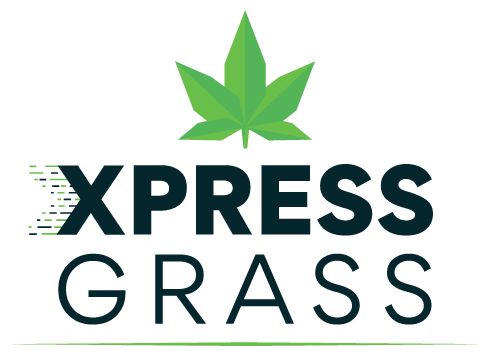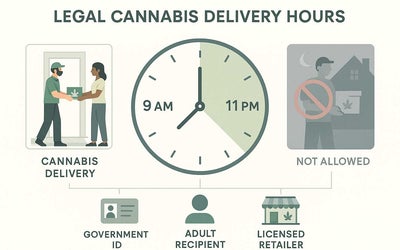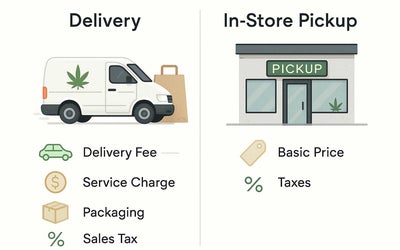*Average Read Time: 10 minutes, 26 seconds
Cannabis use has been on the rise long before recreational use was officially legalized back in 2018. You might be surprised that one of the biggest demographics leading recreational and medical cannabis use are seniors. Seniors might not be the first group you think of when picturing stoners. However, seniors can actually benefit quite a lot from medical cannabis.
The negative stigma around cannabis is still prevalent, but more and more older adults are realizing that what they were told about cannabis was either exaggerated or simply not true. There are, as we’ve mentioned before, many benefits of cannabis (medical cannabis has been legal in Canada for two decades, after all). There’s a long list of ailments that medical cannabis has been able to alleviate, regardless of your age, including:
- Chronic Neuropathic Pain
- Insomnia
- Anxiety
- Nausea
- Inflammation
Cannabis can even help with palliative and end-of-life care. Still, the benefits of cannabis go far beyond that. Cannabis is actually a safer alternative to other drugs (both prescription and recreational) and may even help reduce opioid dependency. This article will continue to examine the many ways that seniors can benefit from medical cannabis.
Cannabis 101 For Seniors
Many of us have been ingrained with a very negative perception of cannabis use since we were young. In the past, “marijuana” has been vilified by the media and government as an “even substance” that would “corrupt the youth” as a “gateway drug”.
According to a specialized Harvard study, that is not the case. Depending on how old you are, you have probably now seen a complete 180 on how marijuana is viewed, including the transition of using the word “marijuana” to “cannabis”. Cannabis has now become the more accurate and socially acceptable term.
What is Medical Cannabis?
Suppose you wanted to use medical cannabis under the government program. In that case, you’d have to obtain medical authorization from your doctor and then register to grow or use cannabis for medical purposes. You might be thinking, “What’s the point in having a separate medical cannabis system if it’s all legal now?“
For one, the prices for medical cannabis patients are more stable. It’s supposed to be cheaper than what the recreational market has to offer. Medical cannabis patients also don’t face the same geographic restrictions either. Patients with medical authorization are allowed to purchase cannabis products outside of their province, while recreational users are not. Medical cannabis patients even have the option to buy from licensed producers directly.
Keep in Mind…
At the end of the day, whether you’re using cannabis medically or recreationally, it’s still the same cannabis plant. There’s no inherent difference between medical cannabis and recreational cannabis aside from the designation (and the amount of red tape).
Some people even consider all cannabis use to be medicinal because you can benefit from cannabis regardless of the “medical” or “recreational” labels. If you’re someone who likes to unwind with a beer (or a glass of wine) or two after a long day, a nice joint could be a great alternative. Not only will it relax you, but you also get the added benefits of CBD and THC as well!
Studies suggest that cannabis is significantly less harmful, and less addictive compared to alcohol. Actually, cannabis isn’t physically addictive at all. Plus, it’s practically impossible to overdose on cannabis while there are millions of alcohol-related deaths every year, according to the World Health Organization. Cannabis, whether it’s medical or not, contains more than 100 different cannabinoids (compounds unique to cannabis), but the two main ones we’ll be discussing are delta-9-tetrahydrocannabinol (THC) and cannabidiol (CBD).
What’s the Difference Between THC & CBD?
In a nutshell, THC is the cannabinoid that gets you high, while CBD is renowned for its medicinal benefits and will not get you stoned. The average THC content in dried cannabis flowers ranges from 10-30%, whereas CBD ranges anywhere from 1-15%. Back in the day, it was hard to find strains containing over 5% CBD.
Nowadays, there are CBD-specific strains that can get up to 20% and even more! CBD is often derived from hemp, a variety of cannabis used for industrial purposes with extremely low levels of THC — typically around 0.3% or less. Both CBD and THC are used to treat various medical conditions. Until recently, anything with THC in it used to be illegal unless you have a medical cannabis license.
Now that all forms of cannabis are legal in Canada, you can choose whether to get the psychoactive properties of THC or not. But the whole reason why cannabis can be so beneficial in the first place is due to how the cannabinoids interact with our body’s own endocannabinoid system.
The Main Benefits of CBD Oil
Pain Relief
CBD helps relieve pain by activating the endocannabinoid system (ECS), which is designed to get the body back to its optimal state. When CBD is introduced, certain scientists think it prevents endocannabinoids from being broken down. This allows them to have a more prolonged healing effect on the body.
Others believe that CBD binds to an unknown receptor that has yet to be discovered. While the exact science is still being thoroughly researched, it is believed that CBD may impact cannabinoid receptor activity, reducing inflammation and neurotransmitter activity, which means fewer pain responses being transmitted. CBD oil is a natural way seniors can ease several ailments.
Other Potential Benefits of Using CBD Oil:
- Reduce Anxiety & Depression – Since CBD is known for its relaxing traits, it will help in calming anxiety and alleviating depression. These symptoms are usually treated with benzodiazepines, which are highly addictive. Many people appreciate the more natural treatment in CBD Oils.
- Potentially Improve Heart Health – Due to the reduced stress and the relaxing effects of cannabis, CBD has helped by lowering blood pressure in users. High blood pressure is one of the symptoms that leads to many heart diseases including heart attacks, strokes and dementia to name a few.
- Relieve Cancer-Related Symptoms – Side effects from cancer and cancer treatments include nausea, vomiting, and pain, all of which can be relieved with CBD.
- Potential Neuroprotective Characteristics – Research is still being done, but CBD might help people with neurological disorders, specifically Parkinson’s and Alzheimer’s disease.
- Supporting Cartilage & Joint Functions – Bones and joints age right along with us, and ageing can sometimes cause pain and discomfort. Meanwhile, CBD oil supports joint and cartilage functions.
- Promotes Healthy Sleep – Together with easing pain, CBD oil can help seniors by providing them with a better night’s sleep because of its relaxing and sleep-inducing compounds.
Can Medical Cannabis Help with Chronic Pain?
According to a recent study, it was found that “62.2% of cannabis users were using it for chronic pain”. We previously mentioned that CBD has pain-relieving properties, and since medical cannabis can contain both THC and CBD, pain relief is considered to be one of the health benefits of marijuana.
Here is a quick summary of how medical cannabis works: naturally produced endocannabinoids in the body help decrease pain, so introducing more cannabinoids should decrease the pain even more! Now, you’re probably thinking, “that’s great, but why don’t I just keep using my regular pain relievers?” We’ll tell you why. Here are some advantages of medical cannabis over regular pain relievers:
- Reduce dependency on one or more opioid-based pain relievers.
- Opioid-based pain relievers can have a long list of serious side effects whereas cannabis has little to no serious side effects.
- Seniors who have had liver or kidney failure can no longer take opioids, but medical cannabis is a great alternative and can replace opioid-based pain medication.
- Medical cannabis relieves insomnia and improves sleep quality. Improved sleep starts a cyclical effect to decrease pain— more sleep (the body’s natural healing state) equals less pain, improved cognition, less anxiety and more.
Like many cannabis-related health issues, long-term studies are underway to further substantiate these health benefits. Talk to your doctor or a health care professional to make sure this option is right for you.
Other Benefits to Medical Cannabis
Medical cannabis is also being used to treat more severe conditions such as:
- Alzheimer’s Disease
- Chron’s Disease
- Cancer
- Glaucoma
- ALS
- HIV/AIDS
- Epilepsy & Seizures
- Multiple Sclerosis & Muscle Spasms
- Extreme Pain & Severe Nausea
Many seniors are also using medical cannabis for overall anxiety, including social anxiety, and depression. A growing number of seniors use medical cannabis to ease their chronic stress, which also promotes better sleep.
Cannabis Improving Appetite for Seniors
Cannabis can help improve appetite — a significant health issue for many seniors. As people age, they may lose their appetite. Appetite loss is dangerous because not eating could lead to many more ailments including weight loss, muscle loss and eventually incapacitation. How can medical cannabis help?
One of the beneficial side effects of cannabis and THC is that they will increase your appetite. The stereotypical image of a stoner locked into the couch with a bag of chips and a smile on their face comes from the fact that certain cannabis strains give you the “munchies”. Setting aside that image, older people who are losing their appetite can face serious problems if it persists. The body needs nutrients to survive and retain muscle mass, especially during the later years of life.
When cannabis is ingested, your brain makes dopamine, which then provides optimistic reinforcement when you eat. In addition to stress and chronic pain relief, using a little cannabis to jumpstart your appetite could be just what the doctor orders. Of course, senior citizens would have to be mindful of the food they consume once their appetite comes back. A big bag of chips on the couch won’t do much for your overall health!
Can Cannabis Be Used By Seniors Safely?
We can’t stress enough; cannabis is much safer than any of the prescription drugs you’ll obtain from your doctors. If you take a look at most prescription medications, there is a long list of possible side effects that you may experience. Some of these side effects may cause issues for you later on or in some cases the symptoms are unfortunately fatal.
For this reason, many seniors are turning to cannabis instead of prescription drugs. Seniors are quickly becoming the most enthusiastic cannabis users, with cannabis use increasing by 75% among Americans 65 years of age and older. However, just because this is a growing trend for the senior citizen community, it doesn’t mean it comes without any possible consequences. As with any pain-relief medication, there can be some side effects. Here are a few potential side effects to using cannabis and cannabis products:
- Increased Heart Rate
- Impaired Concentration & Memory
- Dizziness & Nausea
- Slower Reaction Time
- Increased Risk of Heart Attacks & Stroke
- Potential Adverse Drug to Drug Interaction
Since medical cannabis is relatively new, the long-term effects of using medical cannabis for seniors are still being studied. According to the National Post, “The overwhelming majority of older adults do not experience negative outcomes.”
Speak With Your Doctor
As with any products concerning your health, make sure to speak with your doctor to make sure medical cannabis is right for you. Some of the health risks can include:
- Consuming cannabis can cause balance issues and falls
- It may interact negatively with other medications you are taking.
- People with pre-existing cardiovascular conditions can increase the risk of a cardiac episode.
- Cannabis may adversely interact with people who have pre-existing mental health issues.
- 1 in 10 cannabis users may become psychologically addicted.
Before trying medical cannabis, talk to your doctor to make sure it’s the right solution for you. If it is, start slow with small doses and work your way up from there. The last thing you want to do is overwhelm yourself from the start.
Beware of THC Products
If you are new to taking medical cannabis, be aware of the THC levels. There have been instances where seniors have purchased the wrong cannabis products. It wasn’t suited to their needs and resulted in them being quite stoned. A considerable high is probably not ideal for people who are trying cannabis for the first time.
Although, it is usually nonlife-threatening, and no one has died from a cannabis overdose. To prevent yourself from accidentally getting too high (or getting high at all if you don’t want to), just take caution and make sure to look for the THC content on labels. Most times, seniors will be looking for a high CBD and low THC ratio.
~ Remember, THC is the psychoactive component. Both CBD and THC have tremendous health benefits for seniors, but THC is the compound that produces the psychedelic effects.
Seniors Cannabis Products
One of the easier ways for seniors to take advantage of the health benefits of cannabis is to use products made directly from it. Here are some of the easiest and safest ways to consume cannabis:
Edibles
Cannabis edibles are one of the more popular products for seniors and one of the easiest to consume due to taste. A significant advantage is that they are easy to keep track of in terms of dosages. The labels will prominently display the cannabinoid content. There are numerous edibles available such as:
- Cookies
- Cakes
- Peanut Butter
- Confectionaries (Brownies, chocolate etc.)
- Snacks
- Oils & Butters (used for cooking)
You can even make your own edibles using infused oils or butter, but they may make dosing a bit more challenging. You’ll have to figure out a way to distribute the oil evenly throughout the entire edible to ensure dosage consistency. But, just like any other edible, start off small and work your way up from there. Make sure you wait at least an hour before taking a second dose.
Topicals
Another popular way for seniors to use cannabis is by using topicals. Topicals are cream, salves and lotions that are usually made with CBD. They work well for the elderly because they don’t absorb directly into the bloodstream. This also means there won’t be any psychoactive effects. Topicals are efficient, easy to apply and will go straight to work on the applied area to ease the pain. There are topicals out there that can get you high, but they’re specifically designed to penetrate the skin to get the cannabinoids into your bloodstream. This warrants another reminder that you should check the product label and consult with the cannabis vendor before using your newfound product.
Oils & Tinctures
Cannabis oils and tinctures are also easily consumed and widely used. They usually come in small bottles and are dispensed with a labelled eyedropper. Still, even with the label, it might be harder to get precise dose measurements. The smaller bottle is more challenging to use for seniors with arthritis. However, oils and tinctures are an excellent first step when using cannabis products because they will absorb into your bloodstream quicker if dropped under the tongue.
Capsules
This way of ingesting THC or CBD is easier to measure dosages as the oil is pre-measured and encapsulated. Most pills are easy to swallow and are offered in various dosages and strains.
Conclusion & Takeaways
Medical cannabis and CBD products are becoming more popular, safer and more advanced every day. While more research is happening on conclusive long-term risk, medical cannabis and CBD products are safe to use and are here to stay. More and more senior citizens are turning to medical cannabis and CBD products for various reasons:
- Prefer a more natural approach to easing pain
- Replacing harsh opioid pain-relievers that damage livers and kidneys.
- Looking to reduce their amount of pain medications
- Seeking relief from chronic pain, anxiety and seizures
- Wanting a more relaxing and better-quality sleep
- Looking to increase their appetite
Call or Chat with XpressGrass
In Canada, cannabis products are now legal so talk to your doctor to see if they might be a good fit. Choosing a high-quality product is essential. Once you know what you are looking for, only buy medical cannabis and CBD products from reputable vendors with the proper certifications. If you’re thinking about trying cannabis and CBD products to make your life a little easier and a little more pain-free, then just follow these simple steps:
- Talk to your doctor and make sure medical cannabis is safe for you.
- Do your research and see which products fit your needs.
- Visit XpressGrass and check out our vast selection of cannabis and CBD products to find everything you’re looking for
From CBD oils for aches and pains to cannabis of all different THC levels and flavours, XpressGrass has all the right products for seniors to start their cannabis and CBD journey safely. Call or chat with our team today to get product recommendations, exclusive promotions and more; specifically catered to you. Call 1-855-961-3229 today to speak with our team of cannabis experts!
Loved the article? Sign up for an account!
Login
Register
How Weed Delivery Works Vancouver: A Step-by-Step Guide
Vancouver residents can now order cannabis online with the same convenience they expect from food or grocery delivery. XpressGrass keeps the process clear, fast, and discreet, so you can shop quality flower, pre-rolls, vapes, edibles, and concentrates without leaving...
BC Legal Cannabis Delivery Hours: What To Know Before You Order
British Columbia regulates the hours when licensed retailers may accept and deliver cannabis orders. Most services operate within BC legal cannabis delivery hours, daily windows from 9 a.m. to 11 p.m., and orders placed after 11 p.m. move to the next operating window....
Delivery vs Pickup Cannabis Cost: Comparing Weed Delivery and In-Store Shopping
Choosing between cannabis delivery and in-store pickup affects both your wallet and your day. The right option depends on fees, promos, time saved, and where you live. Below is a clear look at how delivery vs pickup cannabis cost compares, plus practical tips to keep...










